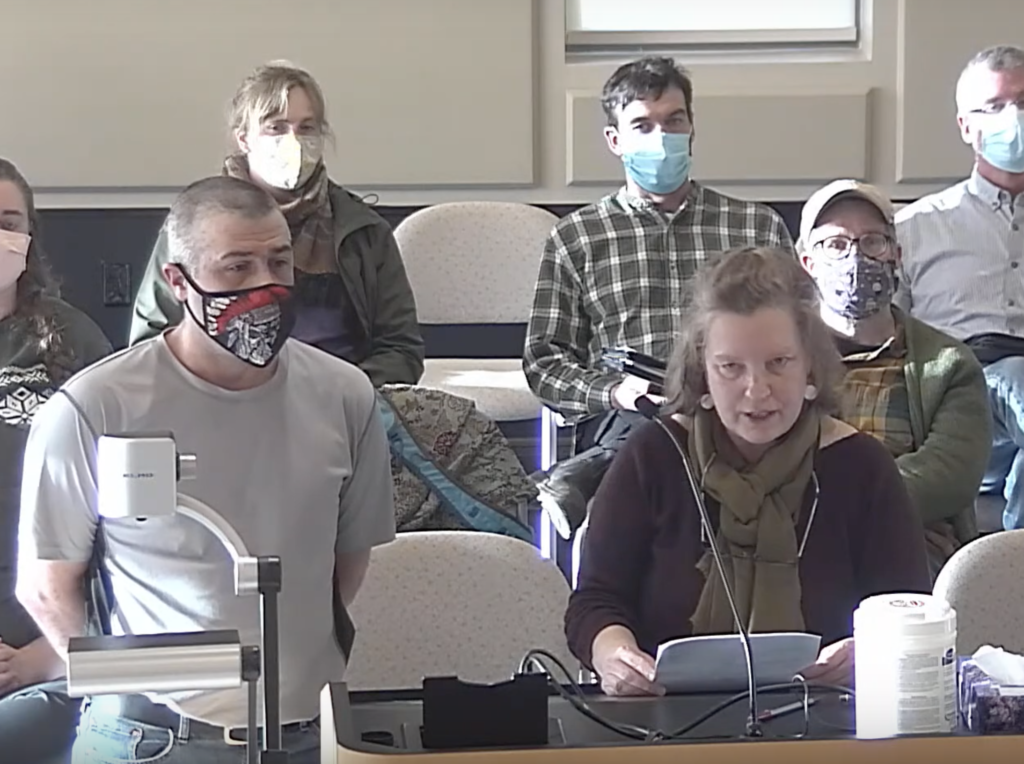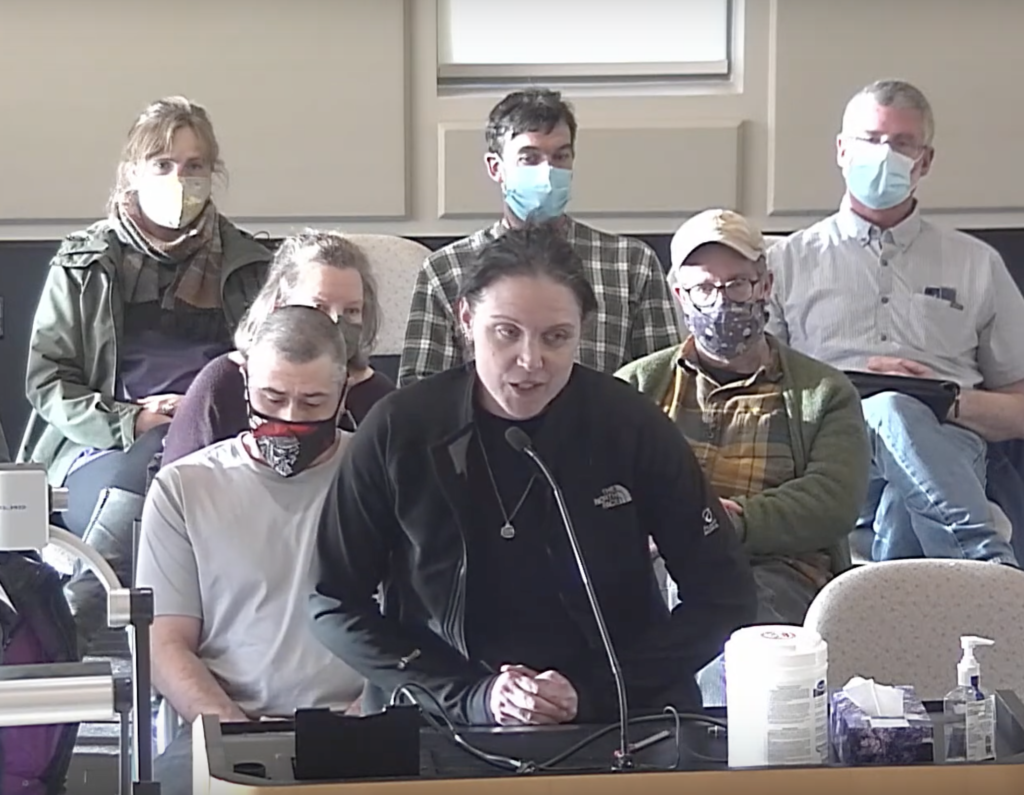
If there were any Sackville town councillors not aware of the developing crisis in housing in the region, that was put to an end on Monday night, after a presentation to council by the Tantramar Affordable Housing Initiative.
Sackville residents Reggie Beal, Ashley Legere and Alice Cotton gave an an eye-opening presentation on the situation being faced by some Sackville families, including testimony from Legere and Beal, who are both facing loss of their current homes.
“It’s very scary,” Beal told council. The home he’s been renting is being sold, and Beal needs to leave. But he says that after 6 months of looking, he can’t find an affordable place to go, even with a full time employment income. Beal works at Rose’s Independent alongside Mayor Shawn Mesheau, who said he’s familiar with Beal’s predicament. “It is an emotional situation,” said the Mayor Monday. “And it affects more people than we realize.”
Ashley Legere is a Sackville resident and Wellness Navigator with Ensemble Moncton. She found out this past weekend that she has three months to find a new home after the house she is renting was sold. The irony of her situation wasn’t lost on Legere. “My job is to literally find housing for individuals who are experiencing homelessness,” she told council. “And I’m going to be probably the first Wellness Navigator who is also going to end up homeless.”

Legere told council that when she looked into options in Sackville comparable to her current rental situation, she found a place at more than double the cost. She suggested that new housing in the area should include a certain proportion of units subsidized by NB Housing, to ensure that there are homes available to people for roughly a third of their income.
Legere said she chose to live in Sackville because the community is safe. “There’s a larger sense of community and belonging here. I felt like I could raise my daughter in a place where I could make a difference,” she said.
Legere is the driving force behind a harm reduction vending machine inside the doors of the United Church at Main and Bridge. She told council that her experience bringing that service to Sackville led her to believe council would be able to help solve the housing crisis.
“You’ve ended period poverty… we’ve helped provide Naloxone for free. We’ve provided donations of snacks for people who are hungry. So I know that you’re able to do those things. I know that when presented with adversity, Sackville doesn’t generally just lay down and take it,” said Legere. “There are a lot of big brains in this town. So I hope that we can all get together and figure out some solutions.”
Alice Cotton spoke about the work of the Tantramar Affordable Housing Initiative, a recently formed group of citizens looking for short term and long term solutions to the crisis. Cotton also drew a stark picture of what the Initiative has learned about the housing and affordability situation in Sackville.
“Sackville’s population has increased by close to 700 people in the last five years, but housing availability has not kept pace,” said Cotton. She pointed to increasing student enrolment for September, a 50% increase in households using the Sackville Food Bank, and increased rents while incomes remain flat.
The Initiative surveyed area residents online about their housing situation and needs, hearing from 97 different respondents in the Tantramar region. The group has published some of the results online, and says the resounding choice of solution to the crisis was to have an independent not-for-profit affordable housing option offered in the community.
Cotton told council the housing initiative is poised to help, with “a group of dedicated people who have experience in developing community initiatives.”
“Some individuals have indicated that they are willing to donate and invest in this initiative, and some others have even said they would donate land,” said Cotton.
The group is working towards creating a not-for-profit to provide “egalitarian housing options tied to the renter’s income, not to the market.”
“We are requesting that the town of Sackville, through staff and councillors, work with the Tantramar Affordable Housing Initiative to move these ideas to exploration, costing and implementation.”
Cotton also had a list of questions for council to consider:
-Would it be possible to acquire a temporary permission for the use of land for mini-homes, recreation vehicles or other temporary structures, while developing longer-term solutions?
-How do we go about developing a plan for affordable, sustainable housing in Sackville and the surrounding rural areas in the Southeast Regional Service Commission?
-How can the Town can provide support in our discussions with developers and landowners in building more affordable housing?
Councillors and the mayor were sympathetic to the plights presented, but there were no concrete offers of help or solutions, at least in the short term.
Mayor Shawn Mesheau said that housing has been a topic of conversation at the Southeast Regional Service Commission, and recommended the initiative members speak to Plan 360 to find out what immediate options might be available in terms of suitably-zoned land.
“I think what’s happened is with this pandemic we’ve realized some of the shortcomings within our system,” said Mesheau.
Councillor Sabine Dietz encouraged the group to keep bringing the issue to council’s attention, and mentioned the possibility of inclusionary zoning, which has been promised as a future planning tool to New Brunswick municipalities.
Inclusionary zoning gives municipalities the power to require certain percentages of new development meet certain goals, like affordability. is a tool that municipalities in New Brunswick have been promised, but still don’t have. Both Dietz and Deputy Mayor Andrew Black mentioned the possibility, but CAO Jamie Burke clarified that the tool has yet to be incorporated in the provincial legislation that governs municipalities, and the suggestion has been that it will be tested out in cities first.
Black said he’s been hearing about the housing crisis at conferences and webinars for some time, and pointed out the breadth of the problem. “The housing crisis is everywhere. It’s across Canada,” said Black. “And so pulling somebody from the community that they want to be and live in, and putting them somewhere else… It’s not a solution at all.”
Black mentioned federal funding initiatives recently announced in the federal budget that could help alleviate the supply crunch. “Groups such as yours should be ready for when some of that money starts coming through federal, provincial and municipal level,” said Black.
Councillors Phinney and Evans also offered their support to the group’s work.
The Tantramar Affordable Housing Initiative is available by email at tantramaraffordablehousing@gmail.com.
